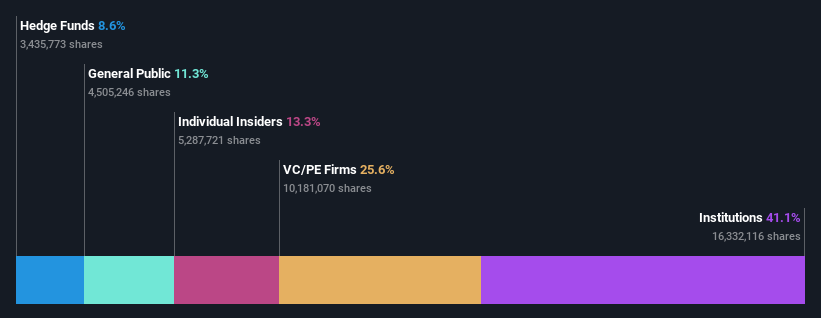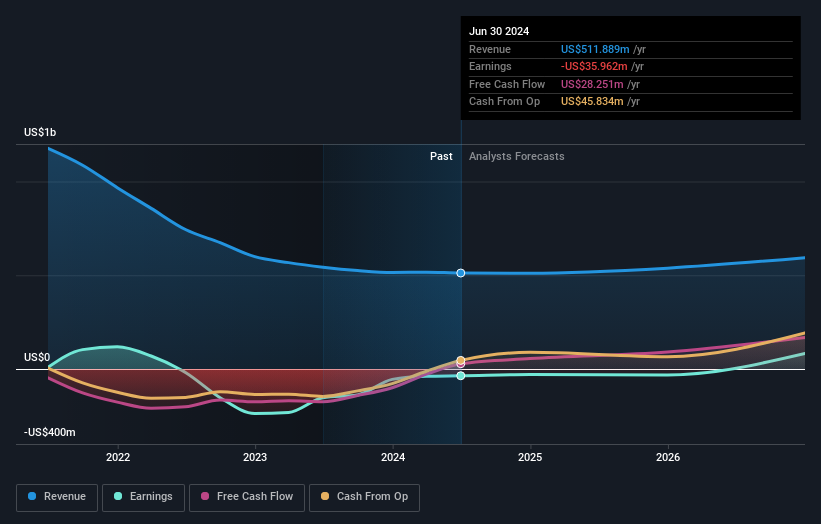- United States
- /
- General Merchandise and Department Stores
- /
- NasdaqGS:GRPN
Groupon, Inc.'s (NASDAQ:GRPN) latest 15% decline adds to one-year losses, institutional investors may consider drastic measures
Key Insights
- Given the large stake in the stock by institutions, Groupon's stock price might be vulnerable to their trading decisions
- The top 4 shareholders own 51% of the company
- Insiders have been buying lately
Every investor in Groupon, Inc. (NASDAQ:GRPN) should be aware of the most powerful shareholder groups. The group holding the most number of shares in the company, around 41% to be precise, is institutions. In other words, the group stands to gain the most (or lose the most) from their investment into the company.
And institutional investors endured the highest losses after the company's share price fell by 15% last week. This set of investors may especially be concerned about the current loss, which adds to a one-year loss of 17% for shareholders. Institutions or "liquidity providers" control large sums of money and therefore, these types of investors usually have a lot of influence over stock price movements. Hence, if weakness in Groupon's share price continues, institutional investors may feel compelled to sell the stock, which might not be ideal for individual investors.
In the chart below, we zoom in on the different ownership groups of Groupon.
See our latest analysis for Groupon

What Does The Institutional Ownership Tell Us About Groupon?
Institutional investors commonly compare their own returns to the returns of a commonly followed index. So they generally do consider buying larger companies that are included in the relevant benchmark index.
As you can see, institutional investors have a fair amount of stake in Groupon. This suggests some credibility amongst professional investors. But we can't rely on that fact alone since institutions make bad investments sometimes, just like everyone does. When multiple institutions own a stock, there's always a risk that they are in a 'crowded trade'. When such a trade goes wrong, multiple parties may compete to sell stock fast. This risk is higher in a company without a history of growth. You can see Groupon's historic earnings and revenue below, but keep in mind there's always more to the story.

It would appear that 8.6% of Groupon shares are controlled by hedge funds. That worth noting, since hedge funds are often quite active investors, who may try to influence management. Many want to see value creation (and a higher share price) in the short term or medium term. Pale Fire Capital SE is currently the company's largest shareholder with 26% of shares outstanding. With 9.9% and 8.6% of the shares outstanding respectively, Eric Lefkofsky and Divisadero Street Capital Management, LP are the second and third largest shareholders. Eric Lefkofsky, who is the second-largest shareholder, also happens to hold the title of Top Key Executive. In addition, we found that Dusan Senkypl, the CEO has 1.1% of the shares allocated to their name.
To make our study more interesting, we found that the top 4 shareholders control more than half of the company which implies that this group has considerable sway over the company's decision-making.
While it makes sense to study institutional ownership data for a company, it also makes sense to study analyst sentiments to know which way the wind is blowing. There are a reasonable number of analysts covering the stock, so it might be useful to find out their aggregate view on the future.
Insider Ownership Of Groupon
While the precise definition of an insider can be subjective, almost everyone considers board members to be insiders. Company management run the business, but the CEO will answer to the board, even if he or she is a member of it.
Most consider insider ownership a positive because it can indicate the board is well aligned with other shareholders. However, on some occasions too much power is concentrated within this group.
Our information suggests that insiders maintain a significant holding in Groupon, Inc.. Insiders have a US$56m stake in this US$424m business. We would say this shows alignment with shareholders, but it is worth noting that the company is still quite small; some insiders may have founded the business. You can click here to see if those insiders have been buying or selling.
General Public Ownership
With a 11% ownership, the general public, mostly comprising of individual investors, have some degree of sway over Groupon. While this size of ownership may not be enough to sway a policy decision in their favour, they can still make a collective impact on company policies.
Private Equity Ownership
With an ownership of 26%, private equity firms are in a position to play a role in shaping corporate strategy with a focus on value creation. Some might like this, because private equity are sometimes activists who hold management accountable. But other times, private equity is selling out, having taking the company public.
Next Steps:
While it is well worth considering the different groups that own a company, there are other factors that are even more important. Case in point: We've spotted 2 warning signs for Groupon you should be aware of.
But ultimately it is the future, not the past, that will determine how well the owners of this business will do. Therefore we think it advisable to take a look at this free report showing whether analysts are predicting a brighter future.
NB: Figures in this article are calculated using data from the last twelve months, which refer to the 12-month period ending on the last date of the month the financial statement is dated. This may not be consistent with full year annual report figures.
New: Manage All Your Stock Portfolios in One Place
We've created the ultimate portfolio companion for stock investors, and it's free.
• Connect an unlimited number of Portfolios and see your total in one currency
• Be alerted to new Warning Signs or Risks via email or mobile
• Track the Fair Value of your stocks
Have feedback on this article? Concerned about the content? Get in touch with us directly. Alternatively, email editorial-team (at) simplywallst.com.
This article by Simply Wall St is general in nature. We provide commentary based on historical data and analyst forecasts only using an unbiased methodology and our articles are not intended to be financial advice. It does not constitute a recommendation to buy or sell any stock, and does not take account of your objectives, or your financial situation. We aim to bring you long-term focused analysis driven by fundamental data. Note that our analysis may not factor in the latest price-sensitive company announcements or qualitative material. Simply Wall St has no position in any stocks mentioned.
About NasdaqGS:GRPN
Groupon
Operates a marketplace that connects consumers to merchants by offering goods and services at a discount in North America and international.
Reasonable growth potential with adequate balance sheet.
Similar Companies
Market Insights
Community Narratives





